牛津小学英语6A语法专项讲解及练习
Unit 6 Period 1 Grammar 课内语法精讲-六年级英语上册(牛津上海版)

6. It takes sb. + 时间 + to do sth. 做某事花了某人多少时间 It took me half an hour to go over my lesson. 复习功课花了我半个
小时。 = I spent half an hour on my lesson.
7. a few, some, a lot of a few一些;some一些;a lot of许多 这些都是表示数量的单词或短语。a few用来修饰可数名词,表示肯定,意为“少数的;几 个;一些”。例如: I have a few books. 我有一些书。 some是不定量代词,意为“一些”,既可以修饰可数名词,也能修饰不可数名词,常用于肯 定句,当用在特殊疑问句中时表示渴望得到对方的肯定回答。例如: I'd like to have some milk for breakfast. 早餐我想喝一些牛奶。 -Would you like some water?你想要喝水吗? -No, thank you. 不,谢谢。 a lot of是一个形容词性短语,意为“许多,大量”,修饰可数名词或不可数名词,常用于肯 定句中。例如: There are a lot of trees in this park. 这个公园里有大量的树。 Tom earns a lot of money by hard work. 汤姆通过努力工作挣了许多钱。
Unit6 Going to school
1. be/live near some place 离/住得离某地近 My school is
_______ my home. 我家离学校很近。 I live _______ my
school. 我住得离学校很近。【答案】near
牛津小学英语6A语法专项讲解及练习

序数词的记忆口诀:基变序,有规律,一般结尾加上th。
一、二、三特殊记,结尾字母t,d,d。
(first,second,third),八去t,九省e,(eight-eighth,nine-ninth),ve结尾时,f来代替,(five-fifth,twelve-twelfth),ty结尾时,y改成ie,再加th, 保证不偏离。
若是碰到几十几,前基后序莫忘记。
(twenty-first)一、基数词、序数词互换。
1. twelve(序数词)________________2. thirteen(序数词)__________________3. ninth(基数词)_________________4. eighteenth(基数词)___________________5. second(基数词)_______________6. three(序数词)______________________7. fifth(基数词)_________________ 8. one(序数词)______________________9. nineteen(序数词)_______________ 10. twenty-four(序数词)________________11. thirty(序数词)_________________ 12. forty-second(基数词)_________________ 13. fiftieth(基数词)________________ 14. thirty-one(序数词)___________________15. twenty(序数词)________________ 16. twenty-three(序数词)________________二、英汉互译。
1. 五月八日______________________2. 三月二十二日_______________________3. 在四月 _______________________4. 在六月三日______________________5. 四月三十日____________________6.三月九日_______________________7. 五月十五日____________________ 8. 四月十二日_____________________9. 六月一日_____________________ 10. 在三月二日______________________11.the seventeenth of February____________ 12.the fifth of September__________ 13.on the twenty-first of December______________ 14. in August____________15.the thirtieth of November_____________ 16.the fourth of January___________ 17.the tenth of July_______________ 18.the twelfth ofOctober______________19.今天是星期几? ________________________________今天是星期六。
(完整word版)苏教版6A牛津英语语法总复习及练习
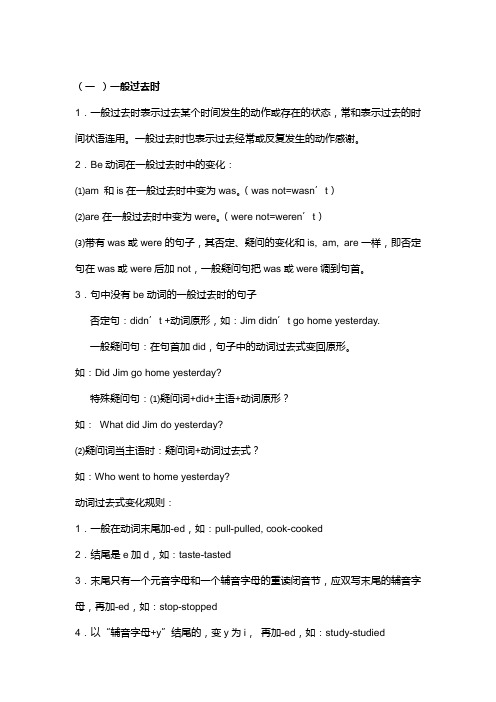
(一)一般过去时1.一般过去时表示过去某个时间发生的动作或存在的状态,常和表示过去的时间状语连用。
一般过去时也表示过去经常或反复发生的动作感谢。
2.Be动词在一般过去时中的变化:⑴am 和is在一般过去时中变为was。
(was not=wasn’t)⑵are在一般过去时中变为were。
(were not=weren’t)⑶带有was或were的句子,其否定、疑问的变化和is, am, are一样,即否定句在was或were后加not,一般疑问句把was或were调到句首。
3.句中没有be动词的一般过去时的句子否定句:didn’t +动词原形,如:Jim didn’t go home yesterday.一般疑问句:在句首加did,句子中的动词过去式变回原形。
如:Did Jim go home yesterday?特殊疑问句:⑴疑问词+did+主语+动词原形?如:What did Jim do yesterday?⑵疑问词当主语时:疑问词+动词过去式?如:Who went to home yesterday?动词过去式变化规则:1.一般在动词末尾加-ed,如:pull-pulled, cook-cooked2.结尾是e加d,如:taste-tasted3.末尾只有一个元音字母和一个辅音字母的重读闭音节,应双写末尾的辅音字母,再加-ed,如:stop-stopped4.以“辅音字母+y”结尾的,变y为i,再加-ed,如:study-studied过去时练习写出下列动词的过去式is\am_________ fly_______ plant________ are ________drink_________ play_______ go________ make ________does_________ dance________ worry________ ask _____taste_________ eat__________ draw________ put ______throw________ kick_________ pass_______ do ________一、用行为动词的适当形式填空1. He _________ (live) in Wuxi two years ago.2. The cat ________ (eat) a bird last night.3. We _______ (have) a party last Halloween.4. Nancy ________ (pick) up oranges on the farm last week.5. I ________ (make) a model ship with Mike yesterday.6. They ________ (play) chess in the classroom last PE lesson.7. My mother _______ (cook) a nice food last Spring Festival.8. The girls ________ (sing) and _______ (dance) at the party.9. I ______ (watch) a cartoon on Saturday.10. Her father _______ (read) a newspaper last night.11. We _________ to zoo yesterday, we _____ to the park. (go)12. ______ you _______ (visit) your relatives last Spring Festival?13. ______ he _______ (fly) a kite on Sunday? Yes, he ______.14. Gao Shan _______ (pull) up carrots last National Day holiday.15. I ____________ (sweep) the floor yesterday, but my mother ______.16. What ______ she _______ (find) in the garden last morning? She __________ (find) a beautiful butterfly.二、句型转换1. Su Hai took some photos at the Sports day.否定句:________________________________________________一般疑问句:____________________________________________肯、否定回答:__________________________________________2. Nancy went to school early.否定句:________________________________________________一般疑问句:____________________________________________肯、否定回答:__________________________________________过去时综合练习一、用动词的适当形式填空1. It ______ (be) Ben’s birthday last Friday.2. We all ______ (have) a good time last night.3. He ________ (jump) high on last Sports Day.4. Helen ________ (milk) a cow on Friday.5. She likes ______ newspapers, but she ______ a book yesterday. (read)6. He _______ football now, but they _______ basketball just now. (play)7. Jim’s mother _________ (plant) trees just now.8. _______ they ________ (sweep) the floor on Sunday? No, they _____.9. I _______ (watch) a cartoon on Monday.10. We ___________ (go) to school on Sunday11. It _____ (be) the 2nd of November yesterday. Mr White ________ (go) to his office by car.12. Gao Shan ________ (put) the book on his head a moment ago.13. Don’t ______ the house. Mum _______ it yesterday. (clean)14. What ____ you ______ just now? I _______ some housework. (do)15. They _________ (make) a kite a week ago.16. I want to ______ apples. But my dad _______ all of them last month. (pick)17. _______ he ______ the flowers this morning? Yes, he _____. (water)18. She ____ (be) a pretty girl. Look, she _____ (do) Chinese dances.19. The students often _________ (draw) some pictures in the art room.20.What ______ Mike do on the farm? He ________ cows. (milk)二、中译英1. 我们上周五看了一部电影。
牛津沪教版六年级上6A时态专题

时态专题Ⅰ.现在完成时1.构成:现在完成时由助动词have + 过去分词构成,助动词have 有人称和数的变化。
第三人称单数用has,其余用have.现在完成时的否定式直接在助动词后面加上not、疑问式是把助动词提到主语之前。
以study 为例,其否定式、疑问式和简单回答形式如下:否定式疑问式I have not (haven’t) studied….Have I studied…?You have not (haven’t) studied….Have you studied…?He has not (hasn’t) studied….Has he studied…?否定疑问式简单回答(肯定/否定)Have I not (Haven’t I) studied…?Yes, you have. No, you haven’t.Have you not (Haven’t you) studied…?Yes, I have. No, I haven’t.Has he not (Hasn’t he) studied…?Yes, he has. No, he hasn’t.When will you finish your homework? 你什么时候完成你的作业?= When are you going to finish your homework?【课堂小练】Ⅰ. Choose the best answer. (错误率:掌握情况:)1. Eddie__________ trees this weekend.A. be going to plantB. will plantC. will plantingD. will be plant2. __________I ________ with you? Sure.A. Shall ... goB. Will ... goC. Can . . . goingD. Am... going3. —__________you _______ free tomorrow?— No. I__________ free the day after tomorrow.A.Are . . . going to .. . willB. Are ... going to be .. . willC. Are .. . going to be . . . will beD. Are...going to...will be4. If Mr. Black comes, we__________ a meeting.A. haveB. will haveC. going to haveD. will be having5. Simon__________ here next month.A. isn't workingB. shall workC. isn't going to workD. will be work6. My parents will go to see a film__________.A. that morningB. this weekendC. last nightD. yesterday7. What are the boys going to do this afternoon?A. They are going to a flower show.B. They go to the park.C. They are watching TV.D. They went to the park.8. __________will her aunt do tomorrow?A. WhereB. WhenC. WhatD. How9. There__________ a dolphin show in the zoo tomorrow evening.A. isB. will haveC. is going to beD. will be having10. Mother__________ me a nice present on my next birthday.A. will givesB. will giveC. givesD. is givingⅡ. Fill in the blanks. (错误率:掌握情况:)1. I________ ______ (go) to Beijing in three days.2. My mother________ ______ (come) here tonight.3. It________ _____ (rain) the day after tomorrow.4. I________ ______ (have) an English class next week.5. What ____________ their teacher __________ (do) next month?6. Y ou ______________ (watch) football games next Sunday.7. That boy______________ (go) to school soon.8. My parents _______________ (take) me to the park this weekend.Ⅲ. Rewrite the following sentences. (按要求改写句子)(错误率:掌握情况:)1. Mrs. Smith is going to buy a new dress. (对划线部分提问)2. They will have a meeting at 2:30 this afternoon. (否定句)3. Mr. Liu will be our Chinese teacher. (对划线部分提问)4. The boys are going to see a film on Children's Day. (一般疑问句)5. Her brother is going to watch cartoons this Saturday evening. (对划线部分提问)Ⅰ. Choose the best answer (选择) (错误率:掌握情况:)1.The book me ten yuan·A.spend B.cost C.eat D-take2.Jerry is my best friend.He often his food with me·A.share B.sharing C.shares D.to share3.Peter often plays football with his friends on Sunday。
牛津英语6a语法归纳
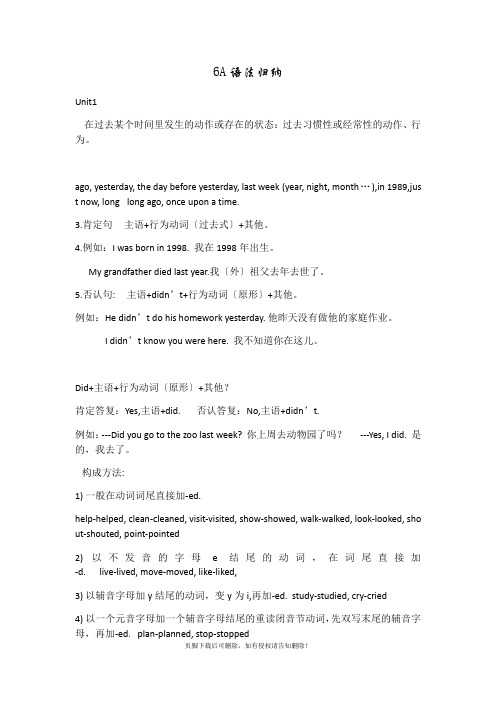
6A语法归纳Unit1在过去某个时间里发生的动作或存在的状态:过去习惯性或经常性的动作、行为。
ago, yesterday, the day before yesterday, last week (year, night, month…),in 1989,jus t now, long long ago, once upon a time.3.肯定句主语+行为动词〔过去式〕+其他。
4.例如:I was born in 1998. 我在1998年出生。
My grandfather died last year.我〔外〕祖父去年去世了。
5.否认句: 主语+didn’t+行为动词〔原形〕+其他。
例如:He didn’t do his homework yesterday. 他昨天没有做他的家庭作业。
I didn’t know you were here. 我不知道你在这儿。
Did+主语+行为动词〔原形〕+其他?肯定答复:Yes,主语+did. 否认答复:No,主语+didn’t.例如:---Did you go to the zoo last week? 你上周去动物园了吗? ---Yes, I did. 是的,我去了。
构成方法:1) 一般在动词词尾直接加-ed.help-helped, clean-cleaned, visit-visited, show-showed, walk-walked, look-looked, sho ut-shouted, point-pointed2) 以不发音的字母e结尾的动词,在词尾直接加-d. live-lived, move-moved, like-liked,3) 以辅音字母加y结尾的动词,变y为i,再加-ed. study-studied, cry-cried4) 以一个元音字母加一个辅音字母结尾的重读闭音节动词,先双写末尾的辅音字母,再加-ed. plan-planned, stop-stopped不规那么变化〔特殊记忆〕:am/is-was, are-were, go-went, meet-met, see-saw, do-did, get-got, read-readUnit21. 〔1〕表示天气的形容词 warm cool hot coolsunny windy cloudy rainy snowy〔2〕形容词的用法:〔3〕形容词可以修饰名词,一般放在名词的前面。
新译林牛津小学英语六年级上册知识点归纳及考查试卷 6a Unit6 Keep our city clean 知识整理与单元试卷
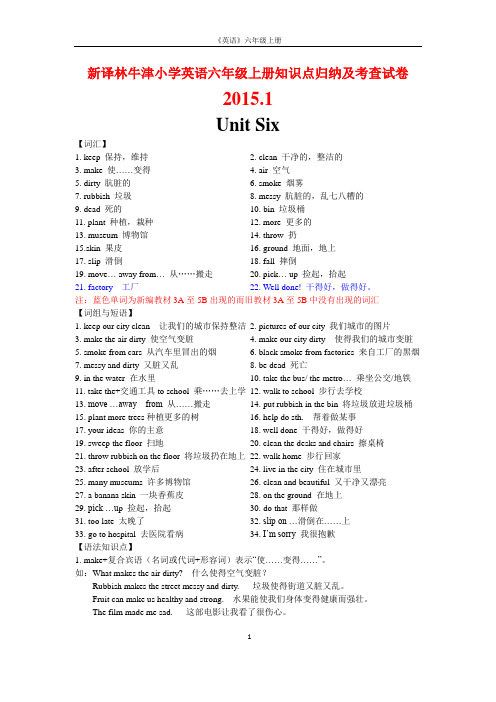
新译林牛津小学英语六年级上册知识点归纳及考查试卷2015.1Unit Six【词汇】1. keep 保持,维持2. clean 干净的,整洁的3. make 使……变得4. air 空气5. dirty 肮脏的6. smoke 烟雾7. rubbish 垃圾8. messy 肮脏的,乱七八糟的9. dead 死的10. bin 垃圾桶11. plant 种植,栽种12. more 更多的13. museum 博物馆14. throw 扔15.skin 果皮16. ground 地面,地上17. slip 滑倒18. fall 摔倒19. move… away from…从……搬走20. pick… up 捡起,拾起21. factory 工厂22. Well done! 干得好,做得好。
注:蓝色单词为新编教材3A至5B出现的而旧教材3A至5B中没有出现的词汇【词组与短语】1. keep our city clean 让我们的城市保持整洁2. pictures of our city 我们城市的图片3. make the air dirty 使空气变脏4. make our city dirty 使得我们的城市变脏5. smoke from cars 从汽车里冒出的烟6. black smoke from factories 来自工厂的黑烟7. messy and dirty 又脏又乱8. be dead 死亡9. in the water 在水里10. take the bus/ the metro…乘坐公交/地铁11. take the+交通工具to school 乘……去上学12. walk to school 步行去学校13. move …away from 从……搬走14. put rubbish in the bin 将垃圾放进垃圾桶15. plant more trees种植更多的树16. help do sth. 帮着做某事17. your ideas 你的主意18. well done 干得好,做得好19. sweep the floor 扫地 20. clean the desks and chairs 擦桌椅21. throw rubbish on the floor 将垃圾扔在地上22. walk home 步行回家23. after school 放学后24. live in the city 住在城市里25. many museums 许多博物馆26. clean and beautiful 又干净又漂亮27. a banana skin 一块香蕉皮28. on the ground 在地上29. pick …u p 捡起,拾起30. do that 那样做31. too late 太晚了32. slip on …滑倒在……上33. go to hospital 去医院看病34. I‟m sorry 我很抱歉【语法知识点】1. make+复合宾语(名词或代词+形容词)表示“使……变得……”。
牛津6A复习语法训练

6A 复习材料(Grammar)1.人称代词主格:I we you she he it they宾格:me us you her him it them形容词性物主代词:my our your her his its their名词性物主代词:mine ours yours hers his its theirs2.可数词的复数形式1)+ s a book –books2)- y+ ies a story—stories3)+ es a glass—glasses a watch-watches4)+s / +es a piano—pianos a mango—mangoes5 - f / fe +ves a knife –knives a shelf-shelves3. 不可数名词(单复数形式不变)bread, rice, water ,juice , food etc.4. 缩略形式I’m = I am you’re = you are she’s = she is he’s = he isit’s = it is who’s =who is can’t =can not isn’t=is notI'd = I would I've = I have etc.5. a/ana book a peachan egg an hour an oval an arange an apple6. 方位介词和时间介词方位介词:on, in ,in front of, between, next to, near, beside, at, behind, at the back of, under时间介词:at six o’clock, at Christmas, at breakfaston Monday on 15th July On National Dayin the evening in December in winter7. 基数词和序数词one – first(1st) two-second(2nd) three- third(3rd)twenty- twentieth(20th)*序数词必须加the8. Some /any( 肯定句用some,否定疑问句变any)I have some toys in my bedroom.Do you have any brothers or sisters?Would you like some juice? 除外9. be 动词(1) 基本形式: am/are/is(2) 肯定和否定句I am(not) from London.My eyes are(not) small.My hair is(not) long.3)一般疑问句:Am I a Chniese? Yes, you are. No, you aren’t.Are they American? Yes, they are. No, they aren’t.Is the cat fat? Yes, it is. No, it isn’t.10. there be 结构肯定句:There is a …There are …一般疑问句: Is there …? Yes, there is./ No, there isn’t.Are there…? Yes, there are. /No, there aren’t.否定句:There isn’t …. There aren’t….*就近原则:There is a pair of glasses on the desk.There are glasses on the desk.11. 祈使句Sit down please。
20202021学年牛津上海版六年级下册语法连词讲解及提升练习(有答案)

20202021学年牛津上海版六年级下册语法连词讲解及提升练习(有答案)___牛津版6B语法-连词讲解及提升练习并列连词:连接两个或两个以上地位平等的词、短语或分句。
but 但是,可是,而,却 and 和,同,与,又,并且, 然后 but的用法:表转折关系【辨析】:however(然而,但是)表示转折,用作副词,不可连接句子,置于第二句的句首、句末或句中。
要特别注意标点的使用。
e.g. She felt ill. She went to work, however, and tried to con ___ntrate. Ali ___ is a good student.However, she has one shorting. The position is all right. There is room for improvement, however. 1. “但是,可是”(相当于yet; however;); e.g. She cut her knee badly, but didn't cry. I'd love to go to the theatre tonight, but I'm too busy. He was tired but happy after the long walk. 2. 用于表示歉意的话语之后,表示谢绝或不赞成;e.g. Excuse me, but could you ___ me where the post offi ___ is? I’m sorry, but I have another appointment tonight. 3. “而; 却”(相当于on the contrary 相反地);e. g. You've bought the wrong shirt. It's not the red one I wanted but the blue one. Tom wentto the ___, but his brother didn't. 4. 含“but”的习惯搭配: ①“not... but...”意为“不是...而是...”,连接两个并列的名词、形容词、副词、短语或分句等; Bamboo is not a tree, but a kind of grass. He failed not because he isn't clever but because he didn't work hard. ② have no choi___ but to do ... 除了...,别无选择 / do/does/did nothing but do... 除了...,别无他事可做③ not only ...but also ...意为“不但...而且...;既...又...”,连接两个并列成分【考例】 --- Would you like to e to dinner tonight? --- I'd like to, ___ I'm too busy. A. and B. so C. as D. but [答案]D。
牛津上海版6A英语Unit4知识点梳理以及能力训练

课题6A Unit4知识点梳理以及能力训练教学目的1.使学生能够基本掌握Unit4中的词汇并且能够进行一些词汇变形练习;2.帮助学生梳理常考一些句型和语法,进行综合训练,提高综合能力。
教学内容Step1: Greetings & Free talkHow are you today? Is there something interesting or important this week?What have you learned in your school? (询问学校课程进度)Step2: Lead in—脑筋急转弯冰变成水最快的方法是什么?【答案】去掉冰的两点水Step3: Words and expressions.1. 询问某人的工作1) What are you?2) What is yourjob?3) What do you do?4) What job do you do?回答:I am a/an…2. teach v. 教teach sb. sth.教某人某事Miss Chen teaches us English this year. 陈老师今年教我们英语。
【联想】teacher n. 老师Miss Chen is our English teacher. 陈老师是我们的英语老师。
3. make的使动用法1) make sb. do sth. 使/让某人做某事Mum made me play the piano for two hours. 妈妈让我弹两小时钢琴。
2) make sb. /sth. +adj. 使……变得…The police make our city safe. 警察使我们的城市变得安全。
3) make sb. /sth. +n. 使……变成……The police make our city a safe place. 警察使我们的城市变成一个安全的地方。
上海牛津版英语六年级第一学期6A期末复习知识点总结
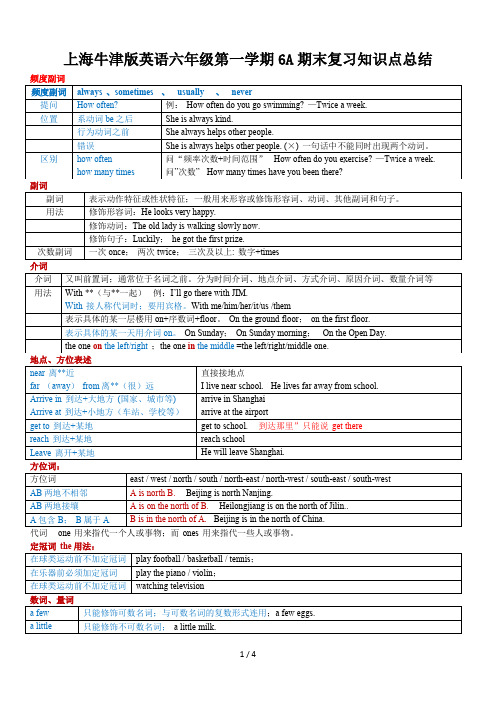
构成:have/has +动词的过去分词
(1)表示动作发生在过去;对现在有影响。I have read this book three times.
(2)表示从过去某一时间开始到现在一直在做某事。I have been in CHINA for three years.
用法
have/has been to 去过/到过 (现在已经回来) have/has gone to 去/到(表示现在还没有回来)
表示具体的某一层楼用on+序数词+floor。 On the ground floor; on the first floor.
表示具体的某一天用介词on。On Sunday; On Sunday morning; On the Open Day.
the oneonthe left/right;the oneinthe middle=the left/right/middle one.
a quarter of 四分之一 three quarters of 四分之三
交通工具
by bus/bike/car/underground/train/ferryHe goes to school by bus.
take a bus/car/underground/train/ferryHe takes a bus to school.
代词 one 用来指代一个人或事物;而 ones 用来指代一些人或事物。
定冠词 the用法:
在球类运动前不加定冠词
play football / basketball / tennis;
在乐器前必须加定冠词
play the piano / violin;
牛津小学英语六年级6A语法练习题8份
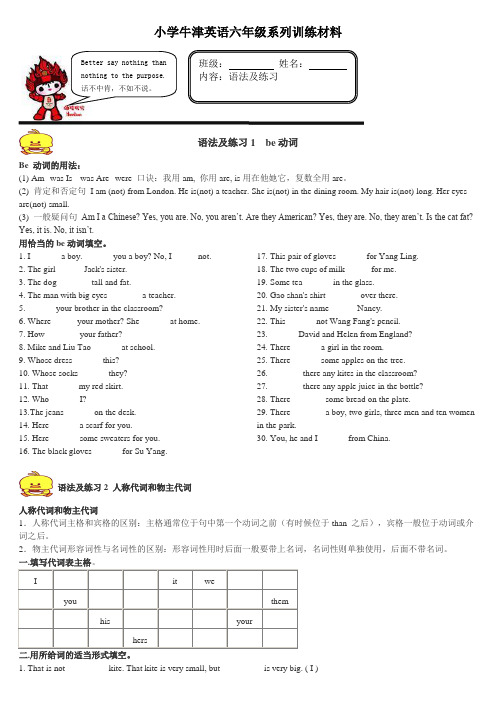
小学牛津英语六年级系列训练材料语法及练习1 be 动词Be 动词的用法:(1) Am--was Is --was Are--were 口诀:我用am, 你用are, is 用在他她它,复数全用are 。
(2) 肯定和否定句 I am (not) from London. He is(not) a teacher. She is(not) in the dining room. My hair is(not) long. Her eyes are(not) small.(3) 一般疑问句 Am I a Chinese? Yes, you are. No, you aren’t. Are they American? Yes, they are. No, they aren’t. Is the cat fat? Yes, it is. No, it isn’t.用恰当的be 动词填空。
1. I ______ a boy. ______ you a boy? No, I _____ not.2. The girl______ Jack's sister.3. The dog _______ tall and fat.4. The man with big eyes _______ a teacher.5. ______ your brother in the classroom?6. Where _____ your mother? She ______ at home.7. How _______ your father?8. Mike and Liu Tao ______ at school.9. Whose dress ______ this? 10. Whose socks ______ they? 11. That ______ my red skirt. 12. Who ______ I? 13.The jeans ______ on the desk. 14. Here ______ a scarf for you. 15. Here ______ some sweaters for you. 16. The black gloves ______ for Su Yang.17. This pair of gloves ______ for Yang Ling.18. The two cups of milk _____ for me.19. Some tea ______ in the glass.20. Gao shan's shirt _______ over there.21. My sister's name ______Nancy.22. This ______ not Wang Fang's pencil.23. ______ David and Helen from England?24. There ______ a girl in the room.25. There ______ some apples on the tree.26. _______ there any kites in the classroom?27. _______ there any apple juice in the bottle?28. There _______ some bread on the plate.29. There _______ a boy, two girls, three men and ten womenin the park.30. You, he and I ______ from China.语法及练习2 人称代词和物主代词人称代词和物主代词1.人称代词主格和宾格的区别:主格通常位于句中第一个动词之前(有时候位于than 之后),宾格一般位于动词或介词之后。
牛津小学英语6A复习提纲(语法句型提纲)

牛津小学英语6A复习提纲(语法句型提纲)牛津小学英语6A复习提纲(短语、语法和句型)学号班级姓名一、词组1.No smoking 禁止吸烟2.No parking 禁止停车3.No littering 禁止乱扔4.No swimming禁止游泳5.Keep quiet保持安静6.Keep off the grass请勿踩草7.No eating and drinking禁止吃喝8.Do not touch禁止触摸9.stay away from避开10.five years old五岁11.make noise制造噪音12.my cousin我的表兄妹13.talk about谈论14.look around环顾四周15.Fine ten yuan罚款10元16.pick up拾起17.take a walk散步18.the fifth of March 三月五日19.take off 脱下20.blow out 吹灭21. a birthday party一个生日会22. a VCD of Chinese cartoons 一盘中国卡通片的VCD23.as a birthday present作为一份生日礼物24. a piece of paper一张纸25.fold it in half对折26. a running race一场跑步比赛27.just now 刚才28. a moment ago片刻前29. a roll of film一卷胶卷30. a pair of glasses一副眼镜31.in July在七月32.Sports Day体育活动日33.watch the moon赏月34. a pair of earphones一副耳机/doc/df2286318.html,st week上星期36.plant trees种树37.pull up carrots拔胡萝卜38.pick up oranges摘橘子39.on the farm在农场40.an exciting film 一部令人激动的影片41.in the mountains在山里42.National Day 国庆日43.have a chat聊天44.have a good time 过得愉快45.at the weekends 在周末46.after dinner晚饭后47.Children’s Day儿童节48.New Year’s Day新年49.their relatives 他们的亲戚50.something to drink一些喝的东西51.dress up装扮52.favourite food最爱的食物53.dragon boat race龙舟赛/doc/df2286318.html,st year去年55.Mid-Autumn Festival中秋节56.Dragon Boat Festival端午节57.Spring Festival春节58.eat rice dumplings吃粽子59.make pumpkin lanterns 做南瓜灯60.police station 警察局61.this morning 今天早晨62.get off 下车63.point to 指向……64.at the back of 在后部65.the present from his friend 朋友送的礼物66.at Christmas在圣诞节67.Christmas Day 圣诞日68.in front of 在……前面二、语法知识1、序数词序数词的构成是在以之相对应的基数词词尾加th,个别例外:◆one –first two—second three—third five—fifth eight—eighth nine—ninth twelve –twelfth ◆以ty结尾的,先变y为i,加thforty—fortieth twenty—twentieth◆缩写形式1st 2nd3rd4th 5th 22nd31st2、规则动词的过去时词尾变化◆一般情况下加ed 如play—played◆以不发音的e结尾的加d 如live—lived◆以辅音字母+y结尾的变y为i,加ed。
牛津小学英语6A主要语法知识及单词词组句式

牛津小学英语6A主要语法知识一般过去时:定义:表示过去某个时间发生的动作或存在的状态,常与表示过去的时间状语连用。
如:yesterday,last night ,three months ago,just now,a moment ago,that night 等。
它的肯定形式:I was born in 1995. I watched cartoons last night.它的否定形式:Were you born in 1995? Yes , I was./No, I wasn’t一般疑问形式及肯(否)定回答:Did you watched cartoons last night? Yes, I did./ No ,I didn’t.特殊疑问形式:When were you born? What did you do last night?动词的过去式形式:a:规则动词的过去式词尾变化:1. 一般情况下加ed,如watered,planted2. 以不发音字母e结尾的加d,如:tasted。
liked,lived3. 以辅音字母+y结尾的变y为i,再加ed,study——studied4. 单音节,以一个元音字母和一个结尾的,双写这个辅音,再加ed,如:stop-stoppedb:规则动词的词尾读音:a) 在浊辅音和元音后读/d/,如:pulled ,wateredb) 在清辅音后读/t/,如cooked , milked ,asked , picked, walkedc) 在/t/和/d/音后读/id/,如:collected , tasted , pointed , studiedc:不规则动词的变化没有什么规律,需要大家背熟记牢:is/am–was are-were do-did have/has-had go-went make-made sit-sat get-got see-saw come-came swim-swam put-put eat-ate drink-drank fly-flew buy-bought run-ran drive-drove know-knew meet-met catch-caught ride-rode sing-sang speak-spoke say-said teach-taught take-took think-thought write-wrote give-gave begin-began tell-told hear-heard keep-kept draw-drew 代词分为两种:人称代词和物主代词。
译林牛津英语6A知识点
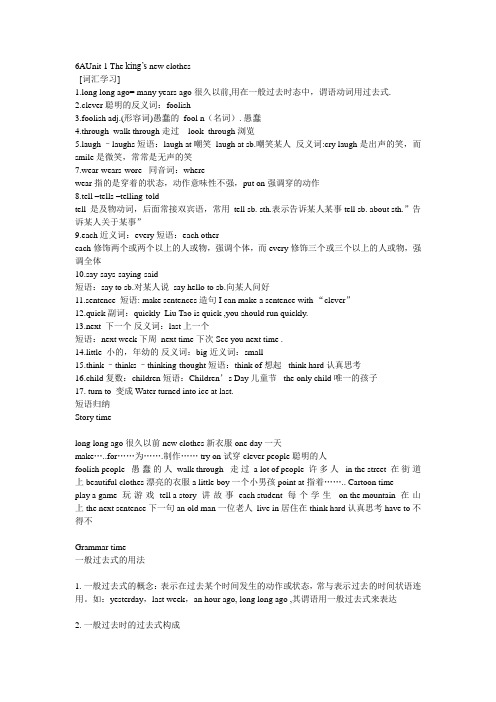
6AUnit 1 The king’s new clothes[词汇学习]1.long long ago= many years ago很久以前,用在一般过去时态中,谓语动词用过去式.2.clever 聪明的反义词:foolish3.foolish adj.(形容词)愚蠢的 fool n(名词). 愚蠢4.through walk through走过 look through浏览ugh –laughs 短语:laugh at 嘲笑 laugh at sb.嘲笑某人反义词:cry laugh 是出声的笑,而smile 是微笑,常常是无声的笑7.wear-wears-wore 同音词:wherewear指的是穿着的状态,动作意味性不强,put on 强调穿的动作8.tell –tells –telling-toldtell是及物动词,后面常接双宾语,常用tell sb. sth.表示告诉某人某事 tell sb. about sth.”告诉某人关于某事”9.each 近义词:every 短语:each othereach修饰两个或两个以上的人或物,强调个体,而every修饰三个或三个以上的人或物,强调全体10.say-says-saying-said短语:say to sb.对某人说 say hello to sb.向某人问好11.sentence 短语: make sentences 造句I can make a sentence with “clever”12.quick 副词:quickly Liu Tao is quick ,you should run quickly.13.next 下一个反义词:last 上一个短语:next week下周 next time 下次 See you next time .14.little 小的,年幼的反义词:big 近义词:small15.think –thinks –thinking-thought 短语:think of想起 think hard 认真思考16.child复数:children 短语:Children’s Day儿童节 the only child 唯一的孩子17. turn to 变成 Water turned into ice at last.短语归纳Story timelong long ago 很久以前 new clothes 新衣服 one day 一天make…..for……为…….制作…… try on试穿 clever people聪明的人foolish people愚蠢的人 walk through走过 a lot of people 许多人in the street 在街道上 beautiful clothes漂亮的衣服 a little boy 一个小男孩 point at指着…….. Cartoon timeplay a game 玩游戏 tell a story 讲故事 each student 每个学生on the mountain 在山上 the next sentence 下一句 an old man 一位老人live in 居住在 think hard 认真思考 have to 不得不Grammar time一般过去式的用法1. 一般过去式的概念:表示在过去某个时间发生的动作或状态,常与表示过去的时间状语连用。
- 1、下载文档前请自行甄别文档内容的完整性,平台不提供额外的编辑、内容补充、找答案等附加服务。
- 2、"仅部分预览"的文档,不可在线预览部分如存在完整性等问题,可反馈申请退款(可完整预览的文档不适用该条件!)。
- 3、如文档侵犯您的权益,请联系客服反馈,我们会尽快为您处理(人工客服工作时间:9:00-18:30)。
序数词的记忆口诀:基变序,有规律,一般结尾加上th。
一、二、三特殊记,结尾字母t,d,d。
(first,second,third),八去t,九省e,(eight-eighth,nine-ninth),ve结尾时,f来代替,(five-fifth,twelve-twelfth),ty结尾时,y改成ie,再加th, 保证不偏离。
若是碰到几十几,前基后序莫忘记。
(twenty-first)一、基数词、序数词互换。
1. twelve(序数词)________________2. thirteen(序数词)__________________3. ninth(基数词)_________________4. eighteenth(基数词)___________________5. second(基数词)_______________6. three(序数词)______________________7. fifth(基数词)_________________8. one(序数词)______________________9. nineteen(序数词)_______________ 10. twenty-four(序数词)________________11. thirty(序数词)_________________ 12. forty-second(基数词)_________________ 13. fiftieth(基数词)________________ 14. thirty-one(序数词)___________________15. twenty(序数词)________________ 16. twenty-three(序数词)________________二、英汉互译。
1. 五月八日______________________2. 三月二十二日_______________________3. 在四月 _______________________4. 在六月三日______________________5. 四月三十日____________________6.三月九日_______________________7. 五月十五日____________________ 8. 四月十二日_____________________9. 六月一日_____________________ 10. 在三月二日______________________11.the seventeenth of February____________ 12.the fifth ofSeptember__________13.on the twenty-first of December______________ 14. in August____________15.the thirtieth of November_____________ 16.the fourth ofJanuary___________17.the tenth of July_______________ 18.the twelfth of October______________19.今天是星期几? ________________________________今天是星期六。
_______________________________20.今天是几月几日?________________________________今天是三月五日。
______________________________21.你的生日在什么时候?_______________________________________我的生日在六月三日。
________________________________________你想要什么作为生日礼物?_____________________________________我想要一台电脑。
_____________________________________________动词的过去时练习1一、用“am , is , was”填空。
1. I _____ a teacher now. I _____ a student five years ago.2. He _____ a worker now. He _____ a little boy ten years ago.3. It _____ there a moment ago .4. The film _____ in the playground a moment ago .5. The newspaper ______ on the table a moment ago.6. The storybook ______ on the bookcase now. But it _____ on thechair a moment ago .7. Where ______ it now?8. Where ______ it a moment ago?9. Yang Ling ______ at home now. But she ______ at school a momentago.10.Wang Bing ______reading books now .But he ______ playing football a moment ago .二、用所给动词的适当形式填空。
1.Tom _______ (visit) a farm last week.2. The twins _______ (water) the flowers in the garden yesterdaymorning.3. I _______ (watch) a film with my friend last Friday.4. My father _______ (be) in London last year.5. What_______ (do) you do three days ago?6. _______ (be) there any parks here in 1950?7. What_________(do) you do just now? I (wash) my clothes.三、按要求改写句子。
1. else, did, last night, what, do, you, (连词成句)What ______ _______ you do last night?2. I’d like a cup of milk. (对划线部分提问)________ ________ you like?3. We are all happy.(改成一般过去时)We _____ all happy.4. I visit my grandparents every week. (用last week代替every week)5. I played a lot of games with my friends at a camp. (对划线部分提问)6. Where are you now? (用just now代替now)7. There were some zebras in the zoo last year. (改为一般疑问句并作肯定回答)8.Tom often does morning exercise. (改成否定句)Tom ________ often _________ morning exercise.9. Nancy often has a big lunch with her family on Children’s Day. (改为一般疑问句作否定回答)_____________________四.用所给词的适当形式填空:1. All the books _____ (be) not here, but they _____ (be) herea moment ago.2. It ______ (be) there just now, but it isn’t there now.3. Your CD Walkman (be) on the ground just now.4. Where’s the camera? It ________ (is) there a moment ago.5. Where ____( be ) the diary now? It _____ (is) there just now.6. It _______ (be) Helen’s birthday yesterday.7. It _____ (be)on the ground just now, but it isn’t there now.8. My parents _______(be) not at home a moment ago.9. Tom _______(go ) to visit a farm last week.10. The twins _______ (water) the flowers in the garden yesterdaymorning.11. I _______ (watch) a film with my friend last Friday.12. My father _______ (be) in London last year.13. What_______ (do) you do three days ago?14. _______ (be) there any parks in the town in 1950?15. Where ______ (be) you just now?I _______ (be) in the classroom.16. What ______ you _______(do) last Friday?We ________(water) trees on the farm.动词过去式的变化和发音规则【过去式的变化规则】① 一般情况下,在动词原形后直接加ed。
如:wanted,played。
② 以不发音的字母e结尾的动词,直接加d。
如:hoped,lived, tasted。
③ 重读闭音节单词需双写最后一个辅音字母,再加ed。
如:stopped,jogged, shopped④ 以辅音字母+y结尾的动词变y为i,再加ed。
